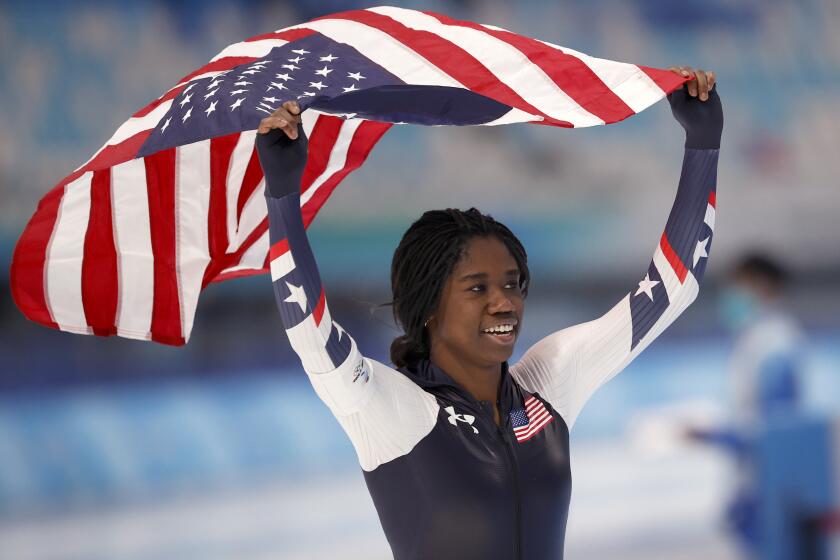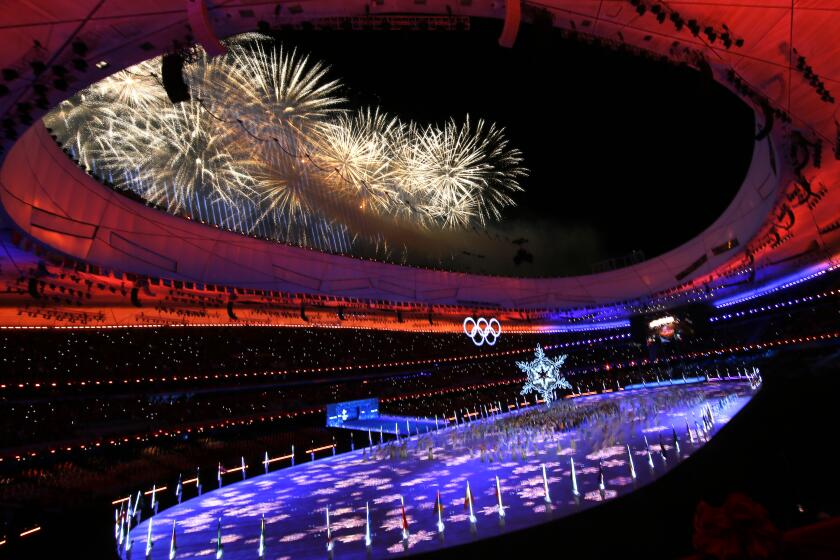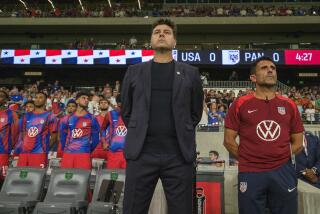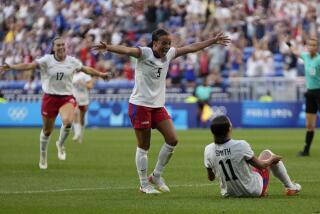Column: Young U.S. men’s hockey prove they’re ready for big stage after holding off Germany
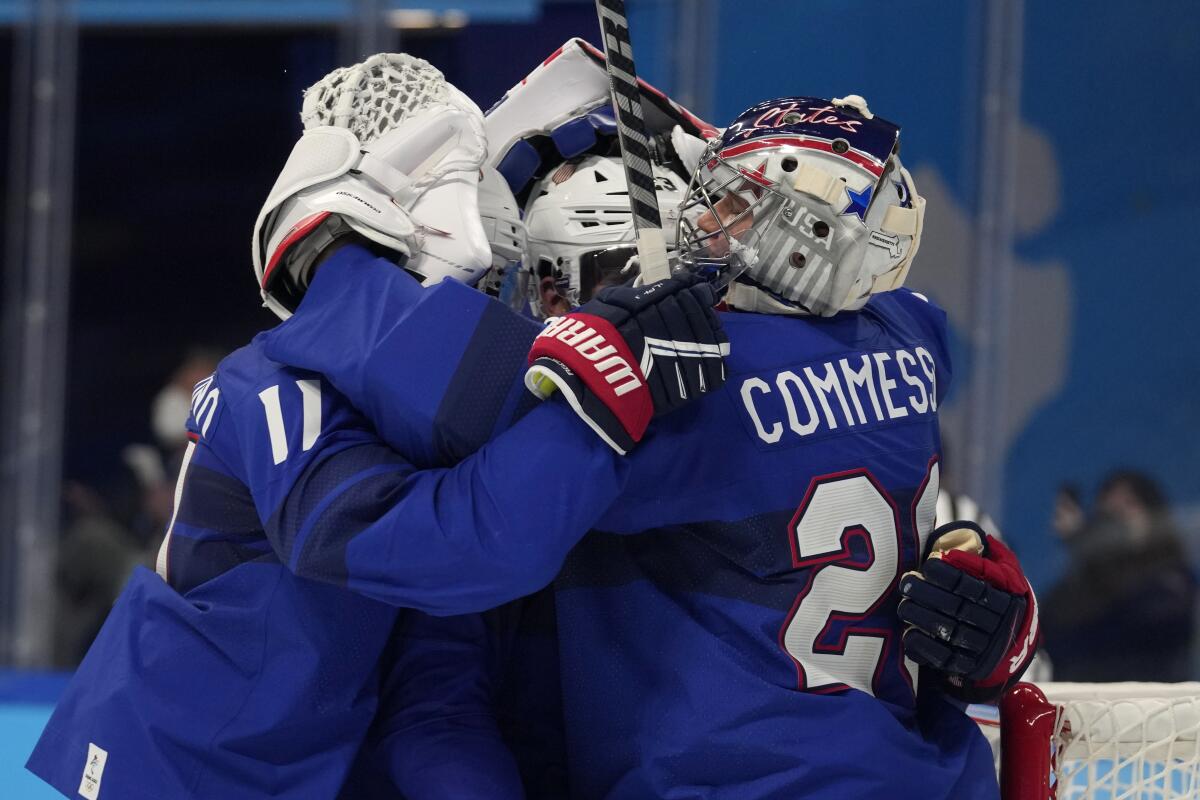
BEIJING — A team young enough that several players brought schoolwork with them to the Olympics aced a different and bigger test on Sunday.
There was no question before the Games began that the U.S. men’s Olympic hockey team would have skill. There was no question the team would have speed throughout the lineup, even though the tradeoff for emphasizing speed and skill would mean they wouldn’t be the biggest team in the tournament.
Any questions about whether they’d be able to handle a rugged game were answered on Sunday when they stood up to a veteran and physically punishing German team and held on for a 3-2 victory at Wukesong Sports Centre in the final game of preliminary round play. They won Group A with a 3-0 record and earned a bye into the quarterfinals on Wednesday. They will face the winner of the qualification-round game between Slovakia and Germany.
The Americans weren’t intimidated by the Germans’ heavy play on Sunday. Nor were they surprised by it.
“Teams are going to try to run us out of the rink,” U.S. captain Andy Miele said, “but I think so far we’ve proven that that’s not going to happen.”
They faced few physical challenges in their tournament-opening rout of China. The intensity ramped up in their 4-2 victory over Canada in their second game, preparing them for the nastiness that developed early against Germany and led to seven minor penalties in the first period.
The Americans matched them push for push and shove for shove until both teams settled down and eliminated most of the chippy play. There were four penalties in the second period and none in the third. “I think that’s what teams are going to try and do against us, is just be physical, being a younger, more skilled team,” said forward Nick Abruzzese, whose lunging wraparound pass set up Matt Knies for the second U.S. goal, at 4:50 of the second period.
Erin Jackson becomes first Black woman to win a speedskating Olympic gold medal for the United States with her win in the 500 meters.
“I think the last two games we’ve done a really good job of weathering that, and I think that’s something that we’ve got to improve upon moving forward.”
They might also consider improving their starts. For the second straight game they gave up the first goal, but, as they had done against Canada, they came roaring back.
Germany connected first, on a power-play goal. Kings defense prospect Brock Faber was serving a holding penalty when Germany capped a sequence of good puck movement by setting up Matthias Plachta for a long shot that was redirected by Patrick Hager past goaltender Drew Commesso at the two-minute mark.
The U.S. matched that with a power-play goal of its own. Steven Kampfer, a onetime Ducks draft pick who played 231 NHL games for Boston, Florida, the New York Rangers and Minnesota, took a shot that got through the traffic in front of goalie Danny aus den Birken at 4:26. It was the first goal by a U.S. defenseman in the tournament.
“It’s nice to get goals from anybody,” coach David Quinn said, “but you’re going to need everybody contributing at different times and in different ways.”
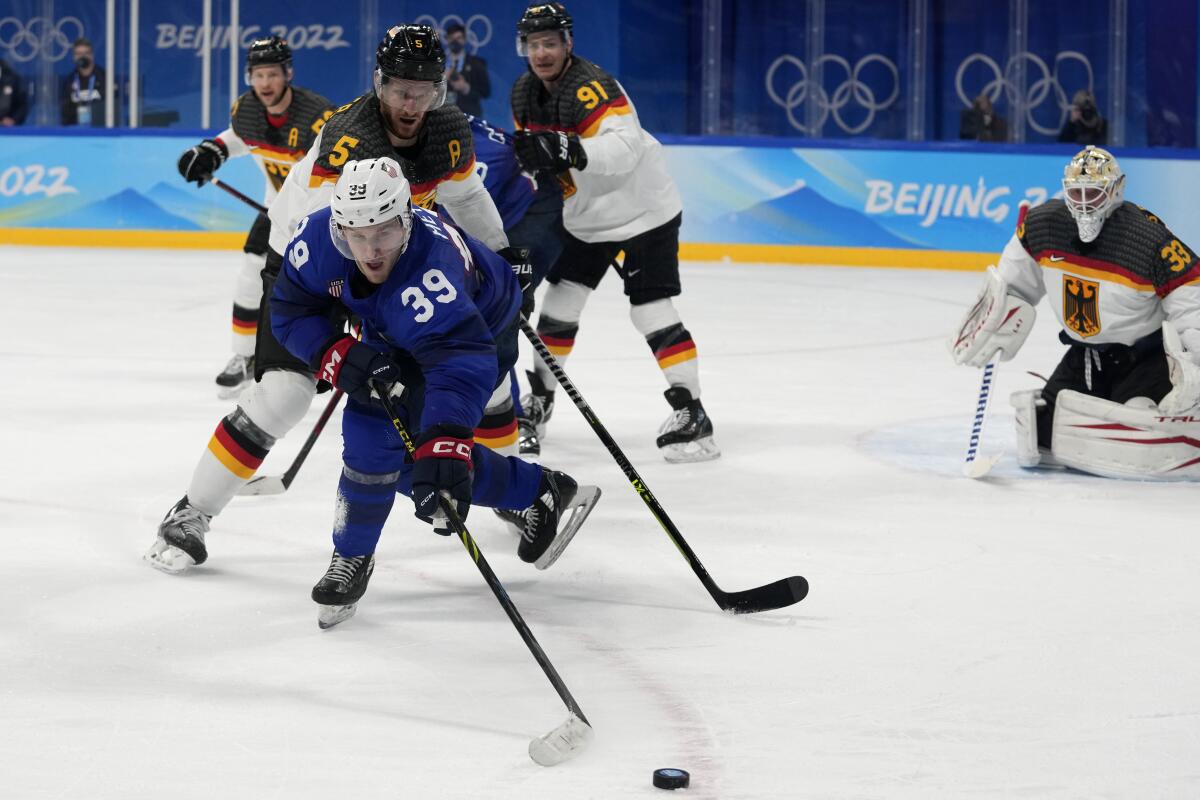
Knies put the U.S. ahead thanks to Abruzzese’s fine pass, ending a period of sustained pressure in the Germans’ zone that included Aus den Birken losing his stick. “It was a pretty surreal play and I just had to put it in the back of the net,” Knies said of the goal, which Germany unsuccessfully challenged.
Nathan Smith, who was one of the top scorers in college hockey for Minnesota State before joining the Olympic team, capitalized on a turnover caused by the Americans’ strong forecheck to pad the lead to 3-1 at 2:47 of the third period. Germany pushed back, scoring on a third effort by Tom Kuhnhackl — who won the Stanley Cup with the Pittsburgh Penguins in 2016 and 2017 — but Commesso withstood some late challenges.
“This was another great building block for our team,” said Commesso, 19, who plays at Boston University and was drafted 46th by the Chicago Blackhawks in 2020.
“Coach has been preaching to us all tournament that we have to get better every single game and this game definitely taught us a lot. They’re a very physical team. They’re big and they brought it to us. We know that teams are going to try and do that to us moving forward. We’re a little bit of a younger team and we play with speed and skill and that’s how teams are going to try and counter us, but we have faith in our coaches to get us prepared.”
Recapping the news, results and highlights from The Times’ team of reporters who covered the 2022 Beijing Olympic Games.
Quinn said he’d like to see fewer soft plays when his team is leading but he has little else to complain about. “We keep making progress. Here we are 3-0 and the No. 1 seed after the preliminary round,” he said. “It’s about all we could accomplish up to this point. We’ve done it.”
But now comes the real test: knockout play. Quinn thinks they’re ready.
“There’s a swagger to us right now and it’s not arrogance,” he said. “There’s a believability that’s gone on here over the past week and it’s put us in this position, but we haven’t really accomplished anything that we want to accomplish yet.”
More to Read
Go beyond the scoreboard
Get the latest on L.A.'s teams in the daily Sports Report newsletter.
You may occasionally receive promotional content from the Los Angeles Times.

